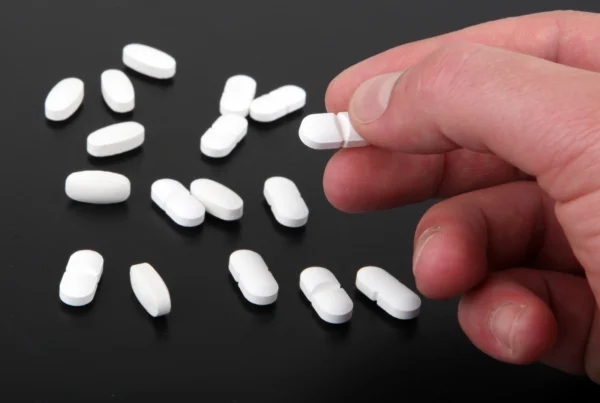
Table of Contents
Key Points
- Pregabalin (Lyrica) treats pain caused by nerve damage and may be used as part of a combination treatment to prevent seizures.
- Lyrica is effective and widely prescribed, but it does have potential for misuse and abuse, leading to its classification as a Schedule V controlled substance.
- Lyrica causes physical dependence and can have serious withdrawal symptoms, including seizures.
- Quitting Lyrica may require a taper schedule, and in the case of misuse or abuse, an addiction treatment program.
Pregabalin (Lyrica) treats pain caused by nerve damage and fibromyalgia in adults. It can be used as part of a combination treatment to prevent seizures in adults and children. While Lyrica is widely used, it’s a Schedule V controlled substance and has misuse risks to be aware of.
What Is Lyrica?
Pregabalin is an anticonvulsant drug sold under the brand Lyrica. It’s used to treat nerve pain from diabetes (diabetic peripheral neuropathy), postherpetic neuralgia (shingles), spinal cord injury, fibromyalgia, and partial-onset seizures.[1]
The exact way Lyrica works to treat nerve pain and seizures isn’t well understood, but it’s believed to lower certain chemicals in the brain to relieve pain and prevent seizures.
Lyrica Side Effects
The most common side effects of Lyrica include:[2]
- Drowsiness
- Dizziness
- Headache
- Tiredness
- Fluid retention
- Nausea
- Dry mouth
- Blurred vision
- Weight gain
- Difficulty concentrating
- Increased appetite (in children)
Though less common, serious side effects can occur with Lyrica, such as severe allergic reactions with breathing problems, fever, malaise, and angioedema, or the swelling of the face, lips, mouth, tongue, or throat.[3] Some people experience suicidal thoughts or actions, and fluid retention or weight gain with Lyrica. Drowsiness, dizziness, and vision disturbances can occur with Lyrica, so it’s important to avoid driving or doing other activities that require alertness or focus until you know how this medication affects you.
Is Lyrica a Controlled Substance?
Yes, Lyrica is a Schedule V controlled substance by the Drug Enforcement Administration (DEA).[4] This is the lowest schedule for abuse potential and includes other widely used drugs like codeine in low concentrations, Lomotil, Motofen, and Briviact.
Lyrica is not known to activate the receptor sites associated with drugs of abuse like opioids or stimulants. However, there have been reports of euphoria, happiness, or calmness, and a high similar to marijuana with misuse of Lyrica, leading to its regulation.[5] It’s important to avoid taking Lyrica with opioid pain medication, anxiety medication, or insomnia medications without talking to your doctor. These drugs act on the central nervous system (CNS) and may interact with Lyrica.
Lyrica’s Potential for Abuse
Lyrica is a controlled substance because it has the potential for abuse, and studies suggest it can produce behavioral dependence, especially in people with a history of substance abuse. According to studies, signs of abuse, like cravings and drug-seeking behavior, were found in 79% of participants.[6]
Lyrica Dependence and Withdrawal
Lyrica is known to cause physical dependence, even when taken as prescribed, which means the body becomes used to the presence of the drug and needs it to function. If you’ve become dependent on Lyrica, stopping suddenly can increase the risk of withdrawal symptoms like anxiety, diarrhea, headache, trouble sleeping, and nausea.[7] You may experience seizures as well.
Never stop Lyrica suddenly or without talking to your doctor. You may need a taper schedule to gradually reduce your dose to minimize the severity of Lyrica withdrawal symptoms.
Lyrica Overdose
Taking too much Lyrica can result in toxicity or an overdose. With misuse, taking higher or more frequent doses increases the likelihood of an overdose. There’s a higher risk of overdose when Lyrica is combined with other drugs, particularly opioids or benzodiazepines.
Some of the symptoms of a Lyrica overdose include:[8]
- Restlessness
- Confusion
- Difficulty breathing
- Irregular blood pressure or heart rate
- Reduced consciousness
- Convulsions
- Coma
Higher levels of toxicity lead to more serious symptoms that require medical intervention and support. If you suspect someone is overdosing on Lyrica, call 911 and wait for help to arrive.
Signs of Addiction to Lyrica
Over 1.6 million people were prescribed Lyrica in the U.S. in 2022. About 22% of people in rehab centers misused Lyrica. Even when using Lyrica as prescribed, tolerance and dependence can develop, but the risk is much higher with misuse or abuse.
The signs of Lyrica addiction are similar to other addictions:[9]
- Needing more of the drug to get the desired effect
- Unsuccessful attempts to stop or reduce the use of the drug
- Seeking out the drug or visiting multiple doctors for prescriptions
- Losing interest in activities once enjoyed
- Lying or stealing to get more of the drug
- Changes in mood and personality
- Strained interpersonal relationships
- Changes in sleep habits
- Poor hygiene or appearance
- Secretive behaviors
Like other addictions to prescription drugs, Lyrica addiction tends to happen gradually and becomes uncontrollable. With Lyrica addiction, it’s important to address not just the physical effects of dependence and withdrawal, but the behavioral aspects of the addiction.
Lyrica may require a taper schedule to gradually reduce the dose and minimize the risk of complications or serious effects. Medical detox may be recommended to manage the taper schedule and provide supervision to address symptoms and prevent life-threatening complications.
Once detox is complete, it’s important to treat the emotional, psychological, and social aspects of addiction, especially if there are other substances involved (polydrug use). Depending on your needs, this may occur in an inpatient or outpatient setting with various personalized treatments. Some of the common treatment options for Lyrica addiction include individual counseling, group therapy, and behavioral therapies like cognitive behavioral therapy (CBT) or dialectical behavior therapy (DBT). These therapies help you uncover the factors that contribute to addiction and adopt healthier habits for long-term abstinence.
Use Lyrica Responsibly
Lyrica is an effective medication for nerve pain and seizures, but it is a Schedule V controlled substance and has potential for misuse and addiction. If you’re struggling to control your Lyrica use, talk to your doctor and seek help for Lyrica abuse to begin your recovery.
Frequently Asked Questions About Lyrica
Below are some of the most frequently asked questions regarding these two medications.
OCEAN RECOVERY EDITORIAL GUIDELINES
The internet contains a vast amount of misinformation, but when it comes to your health only peer reviewed, research centered data matters. At Ocean Recovery, all content published throughout our website has been rigorously medically reviewed by a doctorate level clinician, and cross checked for medical accuracy. Our editorial process helps our readers trust that the information they are consuming is factual and based upon scientific data. Your health is our top priority, find out more about how we safeguard the integrity of information on our website. Read More About Our Process





